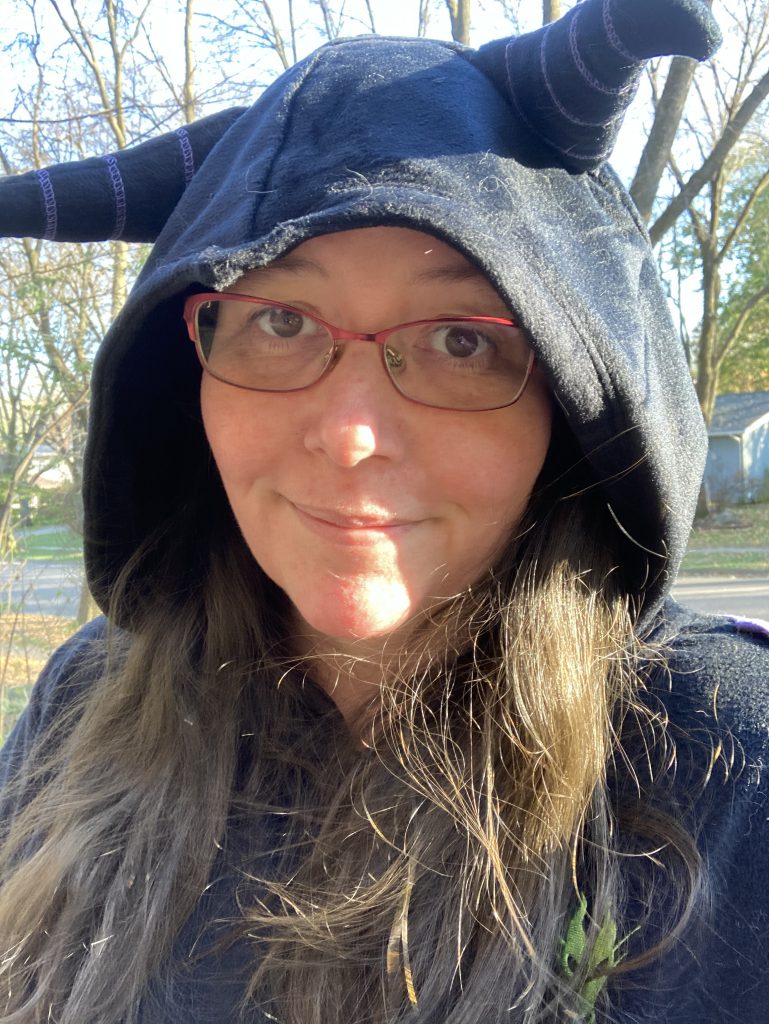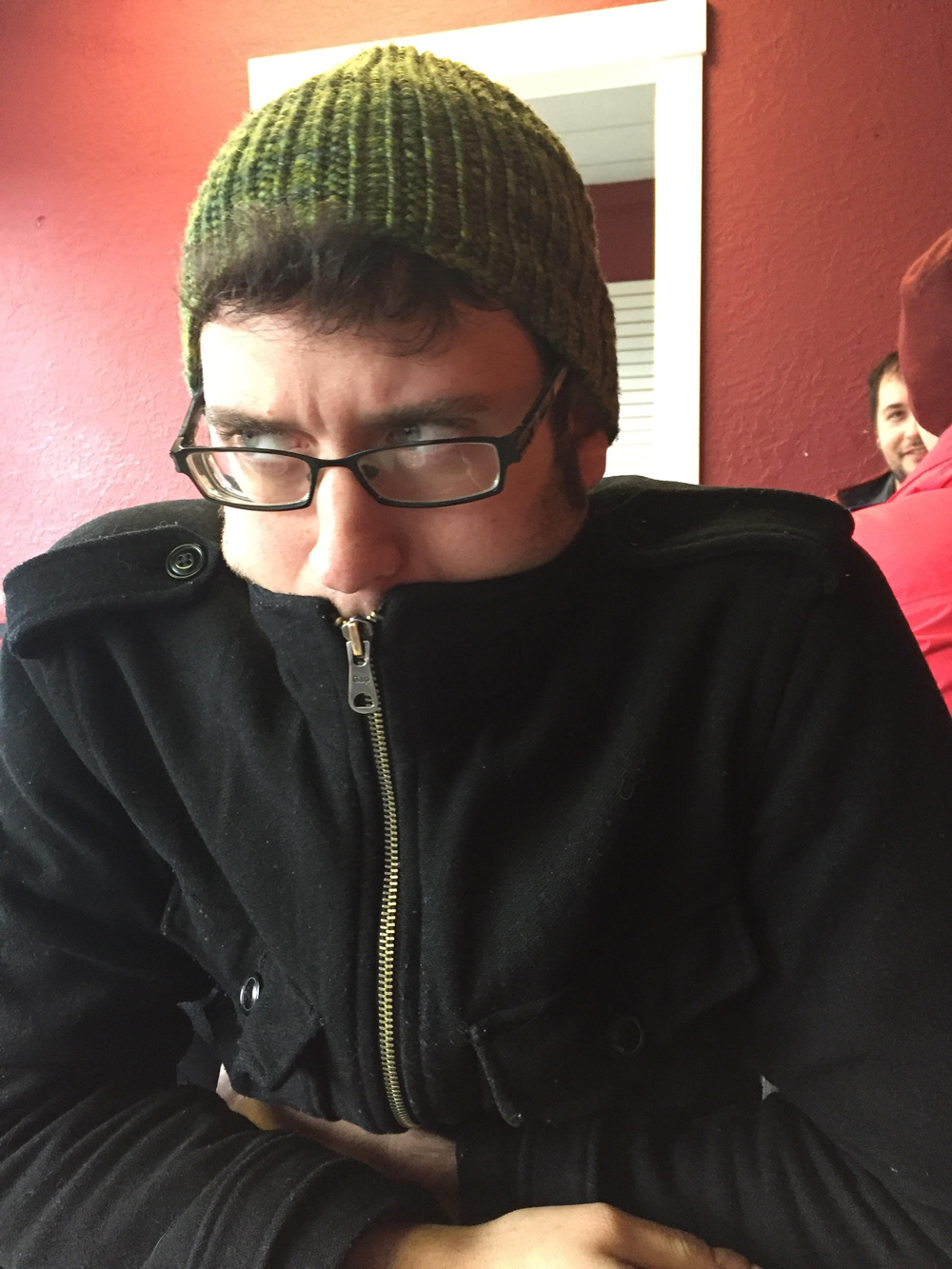edited by Kel Coleman and David Steffen
‘08 is looking at me like ‘08 always looks at me. Like he can’t believe what he’s seeing. Like I’ve hurt someone or killed someone very close to him. That look on his face makes me sick. His name tag has our name scratched out on it, then 2008 written beneath it. He still can’t believe everyone here is him, is me, is us.
I want to tell him he’s here because something’s wrong with him, too. That if all were well with us…with me, rather…there would have been no need for the keys.
I play with mine. It’s some kind of bronze, smooth and rounded. Old fashioned. It flips nicely in my fingers. There are dates stamped neatly into the metal, one on this same day in March every two years, the little edges of the numbers having been gradually worn smooth by my fingernail.
“You know what pains I’ve taken,” ‘32 says to the group.
I resent his pomposity. The way he seems above the fray. From the perspective of what I am—who I am even—both extremes seem a terrifying outcome. Young and naïve vs. old and over it. Neither suits me.
“Well, most of you do,” ‘32 continues. “I’ve told you numerous times, by which I mean once.”
It’s terrible to know what’s coming. The pressure of my knowledge adds to the stuffiness of the room, a wood-paneled church basement that appears to have been outfitted in the seventies. I want to open one of the windows that sit high up on the walls, their opacity filtering the light and somehow adding to the thickness of the air.
“I’m here to save you…us.” He pauses. “Me.” ‘32 looks around the room at us, his face serene, beatific. “I know how you feel. After all, I was you. I’ve been you. I want to help you. All the same, I know things can’t be rushed. I know exactly when things will start to happen. I also know the fragility of the timeline. So far, we’re on track. I’m here after all. But it’s tenuous.”
‘18 leans over to me, elbows on his knees with his hands folded in front of him. “I’ve always wondered what he means by that,” he says in a low voice.
I realize I’m also leaning over, my elbows also on my knees. We must look like twins, the two of us. I’m wearing the same hoodie he is, though it’s two years older now with a big hole in the elbow. “He means any one of us could off ourselves at any point,” I say. It’s funny how natural these words feel, even though I remember hearing me say them to myself when I was ‘18. It doesn’t feel rehearsed. “But ‘32’s existence here proves it hasn’t happened yet.”
‘08 is still giving us that sickeningly terrified look. I try to remind myself how hard it was. He’s only had the key for a couple days. He only just found the door. He’s got no idea what any of this means or what a difficult path he will be traveling over the coming years.
I shake my head. How ridiculous that I’m trying to save myself. By the looks of it, things are going to get rougher. ‘22 and ‘24 look like they haven’t bathed in a while. I wonder what the story is, but I’m afraid to ask. I know I’m not looking so hot myself what with my recent unemployment, but there’s some kind of split between me and these guys. Even in 2008 I noticed it. Something big is coming for me soon. Something bad.
“Before I start our individual consults, I want to let you know how thankful I am for all of you,” ‘32 continues. “I can’t be me without all that came before. It’s not an easy road and nothing I say will make it any easier.”
‘24 wipes his eye with a tissue. There’s a fresh-looking scar on his cheek, still red and angry. Christ, what does that guy know?
‘32 stands up. “While I go through the consults, there’re some refreshments over there on the table. Feel free to help yourself to some coffee or one of the doughnuts. ‘08, I’ll start with you.”
‘08 is oblivious. He’s not aware that we refer to each other by year. “He’s talking to you, partner,” ‘28 says, patting ‘08 on the knee. ‘28 at least looks showered and clean. His grey hair is slicked back and he has fresh clothes.
‘08 stands and follows ‘32, his face still frozen with that look of terror, leaving the rest of us sitting in a circle on our folding chairs.
*
“What is all this even?” ‘12 asks, pressing the button on the Keurig and waiting for it to fill his cup.
“Come on, I know you feel it already,” I said, flipping open the container of doughnuts. This is my year to get the cake doughnut with sprinkles. Oh, how I’ve been waiting for that one. Every other time I’ve come here, it’s been gone by the time I get to the boxes.
“Feel what?” ‘12 asks.
“The darkness. The depression,” I say, sinking my teeth into the pastry. It’s every bit as good as I hoped it would be.
“That makes no sense. I’ve got it made. The kids have just been born. I have a great wife, great house, great job. Does something bad happen?”
I give him a stare, remembering how it was to be him and see my face, the lines in my cheeks more defined, the grey cropping up in my beard. “And you ask yourself every day why those things don’t make you happy.”
‘12 pauses as though paralyzed. I can still feel that moment, how the machismo of false positivity stopped with those words. How it was the first time I’d given that thought any credence, that maybe things weren’t as great as they seemed.
I pat him on the shoulder and walk away, finding ‘22 and ‘24 over by themselves, taking another bite of doughnut along the way. “Hey, guys,” I say.
They nod their acknowledgment, but their faces remain grim.
“Look,” I tell them. “I can sense something’s coming. You two have always looked rough. The roughest of the bunch.”
They remain hunched and silent, warming their hands on the styrofoam cups of cheap coffee. Hands that are dirty beyond cleaning, as though they’ve been burrowing in the dirt.
“I’m not going to ask what happens. I know you won’t tell me anyway.”
They both grunt and sip from their cups. I can’t help it. I’ve always been curious about them, but now they’re next in line. At some point within the next two years, I’m going to become them.
“‘10, it’s your turn,” ‘32 barks from the hall. ‘08 is nowhere to be seen as he’s been shuttled back through the door and back to his year. ‘10 trudges obediently, if trepidatiously.
I remember what ‘32 told me when I was ‘10. He told me to keep a positive mindset and to meet life’s challenges with an open heart. I remember thinking ‘32 was off his rocker. Every time since then had been some variation of that same psychobabble. He knows what I’m going through, so he knows I can endure and make it through. That I’ll be fine despite life’s challenges.
I don’t know why I keep coming back. Maybe it’s because it assures me I’ll make it through, not succumbing to my thoughts of self-harm. Maybe it’s just for the doughnuts.
“Can you guys believe how naïve those young ones are?” I ask ‘22 and ‘24.
“Look, kid,” ‘22 begins. “I know you think you can be chummy with us because our numbers are close. But the truth is, you’ve got absolutely no idea what’s coming.”
“Tell me.”
“Can’t,” ‘22 says, finishing his coffee. “It would ruin the surprise.”
“Come on,” I protest. Until now, I’ve always been scared to ask them about their story. “I can smell the divorce coming. I’m guessing I can’t find a job. I mean, no offense, but it looks like I’ll be homeless for a while—”
“Stop,” ‘24 interrupts.
“Geez,” I say, gesturing at the more collected ‘26, ‘28, and ‘30. “We know things will get better. I mean hell, from the look of things, we’re going to wield some sort of crazy power. See the way they dress? They’re like CEOs.”
“We’re not going to tell you what happens,” ‘24 states, his voice gruff.
“I’m not asking you to,” I say, defensive. “I’m just trying to…” I can’t think how to finish. I’m trying to make sense of it all. I’m trying to find answers. Clearly, whatever happens in the coming years is massively important. Why else would ‘32 be going to such lengths?
“‘12,” ‘32 calls from the hall.
I watch ‘12 march off to his conference. What an overconfident punk, I think. He has no idea what’s coming. The depression. The doubts. The darkness.
I’ve wandered away from ‘22 and ‘24, the conversation going nowhere.
‘14 approaches me, his eyes not meeting mine. “Look,” he says, “I know you know what I’m about to say.”
I do. The humility and fear are still deep in me.
“I’m sorry about how I was,” he says.
“It’s okay,” I say, hating how this feels.
“No, really. I know what you were talking about last time. I do. I ask myself every day why all the wonderful things in my life don’t make me happy.”
Knowing the necessity my former self felt to get this off his chest, I listen without comment, waiting for it to be over.
“I can see now that things will get worse before they get better.”
Lifting my coffee to my lips, I avoid telling him what I really think. There will be ups and downs, but he’s essentially right, the trajectory trends toward worse rather than better, and my future faces tell me I’m not out of the woods yet. Not by a long shot. By the looks of ‘24, it’s going to nearly kill me before I come out of it.
“‘14,” ‘32 calls from the hall.
“I’ve gotta go, man,” ‘14 says. “But I hope you know I’m rooting for you.”
I cringe as ‘14 walks away. Even he doesn’t know what the depression is going to drive him to. I’m the one who should be rooting for him. If he doesn’t make it through those long nights and those dark days, I won’t be here. It makes me wonder how fragile the timeline really is. Obviously fragile enough that ‘32 feels the need to keep reinforcing it every two years.
I remember thinking I was a dick for not responding to my moment of vulnerability. Maybe I should have said something, but it’s too late now. Sighing, I take a seat in one of the folding chairs, listening to the light murmur of the others talking.
A twinge of jealousy punches me in the gut when I look at the late ‘20s. What will it be like when I get there? They appear so refreshed, so energetic. To be honest, I’m looking forward to it, though I can see the hurdles I’m going to have to jump over the next four years or so.
“‘16,” ‘32 calls down the hall, ‘16 already schlepping his way.
What’s so wrong with me? I wonder. All of this just to get me through a bout of depression. Not that I’m not grateful, and obviously this is going to be a long haul, but how come I can’t just deal?
Shame fills me. The moment is a lonely one. I can’t even socialize with myself. It feels like there’s a break on either side of me. The younger ones don’t get it yet and the older ones don’t think I get it yet.
But that’s the thing with depression, I suppose. You feel isolated even when you’re surrounded by people. Even when those people are you.
I sit for a while, quietly eating my doughnut and sipping my coffee. ‘18 gets called in, giving me a stiff-lipped smile as he marches off.
Now I’m in uncharted territory. I’ve never been in the room at this point before. Not that anything bad has ever happened, but this point always makes me nervous. I finish my coffee and get up to throw my cup away. Over by the trash can, I notice a set of stairs leading to a door. It’s not the door we all came in, so, naturally, I’m curious. What does the world of 2032 look like? Is the world of twelve years in the future so drastically different from my own? I wouldn’t mind some fresh air, either. It’s always been stuffy down here, but my consult usually comes up pretty quickly. I put my foot on the bottom step.
“Hey,” one of my selves shouts behind me.
“What?” I say, turning.
“Whatever you do, don’t look out there.” It’s ‘28, and he looks gruff and mean now, a stark contrast to how he’d been a moment before.
“Why?” I ask, my heart pounding.
“Because it’s not for you to know. Not yet.”
“What isn’t?”
“The future,” another voice says.
I turn to see ‘32 in the hallway. “Oh, come on, it can’t be that different out there. I mean, maybe I’ll see what some newer-model cars look like.”
All my future selves cringe at my statement.
“It’s okay everyone,” ‘32 admonishes the group. “Remember, his is the pivotal year.”
“Pivotal year?” I ask.
“Come on,” ‘32 says, beckoning me down the hall. “It’s your turn.”
*
“What was that all about?” I ask him.
‘32 opens the door and motions me in as he has done every two years. “All in good time,” he says.
“Yeah, but, they made it sound like there’s something scary out there,” I say, obediently entering the room.
“There is,” he responds.
I reel. It seems comical to believe that something could be seriously and drastically wrong outside. What could be so different and so obvious that seeing it would cause some sort of breach in the fabric of the universe?
But the room settles me. It’s comfortingly normal and familiar. There’s a billiards table in one corner and several aged and overstuffed couches surround the space. This must be the place where the youth group meets. One can almost smell the zit cream.
“Okay,” I say to ‘32. “I know you know things are getting hard and I can tell they’re about to get harder. I’m guessing my marriage is about to fall apart and I’m not likely to find a new job by the looks of my next two selves.” It’s arrogant of me to speak like this. I’m trying to show off to ‘32, to let him know I’m not as naïve as I appear.
“I’m not here to offer you therapy,” he says.
I scoff. “Then what the hell have we been doing? Every time I come in, you’re giving me advice and guiding me through my life. And honestly, it’s helped. I can see the trajectory. You know, even though things get worse, they eventually get better.”
“That’s never been the point,” ‘32 insists, opening a closet in the far corner of the room.
“Then what’s the point?”
“Acclimation.” He is rummaging, pushing unseen objects around.
“To what?”
“You see,” he says, emerging from the closet. Whatever he’s holding, he’s hiding it behind the couch. “If I had brought you to this point first, the shock of the whole situation would have been dismaying. Crushing.”
“What situation?” I hate that he’s playing coy.
“I had to get you used to the concept of time travel. Do you remember how shocked you were back in ‘08?”
I nod.
“Just seeing all those versions of yourself was nearly enough to send you over the edge.”
“So this hasn’t been about therapy? About managing my depression?”
‘32’s face softens. “It never was. Sure, there’s some darkness in us, but it’s nothing a little old-fashioned talk therapy couldn’t solve.”
I’m ready to punch him. “Then why didn’t you suggest that? I feel like I’ve been suffering for all these years but I’m just holding on because you’re going to show me how to get better. Every time, I’m sure you’re going to reveal the secret to me and show me how to live my life and become peaceful and successful.”
‘32 can no longer hide his amusement. “I’ve done my job then. Here,” he says, brandishing the object he’s been hiding behind the couch. It’s a book. A book about gardening.
“What am I supposed to do with a book? I’m hurting, can’t you see that?”
“Take it,” he repeats, brandishing the book as though it was a weapon.
I reach out, the tome cold and firm in my hands. “Why?”
My future self bends down and hauls a duffel bag over the back of the couch. “This too.”
The zipper hangs open and I can see stacks of cash and boxes of seeds. I see other books: philosophies on government, books on wild mushrooms. “I…I–I,” I stutter.
“The next few years will be unfathomably difficult,” he says. “It’ll all start in about a month. A disease will ravage the Earth. Political strife follows and the government will crumble.”
Terror fills me. The book in my hands feels absurd, impotent against anything he’s describing. Could this book make me immune to the disease? Was I supposed to bash intruders over the head with it? “I’ve never grown a single plant in my life.”
“You don’t think I know that?” ‘32 says. “Your wife will indeed leave you, but it’ll be because you’ve taken a sudden interest in living off the grid, learning the skills that will aid the survival of the species. How do we grow food when the world as you know it doesn’t exist and you can’t go grab a bag of fertilizer at the hardware store? How do we forage for what we need?”
“I don’t want to starve.”
His face becomes grim and hard. “The future is no kind place. Humanity will need fortitude. Resolve. And you,” he says, poking me in the chest with his forefinger. “You will teach them how. How to rebuild. How to thrive again.”
“Why me?” I ask.
“Why not you?” he replies. “Life is nothing more than a series of circumstances. You will not be able to help the position life puts you in just as those who die will not be able to resist their own fates.” He walks over to a window of frosted glass, taking the crank in his hand to turn the panes out. “The world you have known will soon be over.”
My eyes fall on the scene outside. Blackness and ash cover everything I can see. Skeletons of buildings lay scattered here and there. I wonder how this particular structure has survived. I wonder how we have coffee and doughnuts.
“Enjoy what’s left of it,” he says, “but be ready. I’ll keep you supplied.” He turns to me, hands hooked together behind his back. “Can’t you see how this would have been too much to take in all at once? The key and the door alone are hard to accept, let alone the end of everything as we know it.”
My stomach turns. The urge builds to turn and run, leaving his—my—gifts behind and never looking back.
“You won’t,” ‘32 says as though reading my thoughts. His thoughts. Thoughts he himself had twelve years earlier. “Just contemplate all that has been invested in you. Imagine the resources it took to place the door and to get the key in your hand. Then imagine the scarcity and difficulty of procuring said resources in a world that looks like this.”
I look down at my hands. Am I really worth all this? Some days I struggle just to get out of bed and face the world. I’m not some messiah, ready to save humanity from its undoing.
He gestures out the window, and for the first time, it dawns on me what ‘32’s stature must be. This simple meeting with coffee and doughnuts in the basement of a church must only be available to a king in a world like this.
“Make sure you come back in two years. The door will be here even if other things will be missing. You will receive further training and supplies. You, I, we…are all the hope that’s left. It begins with us. That’s why it’s so important to keep the timeline on track.”
I hear his words, but it feels as though they come at me from the end of a long hallway. His hand is now on my shoulder and he’s leading me toward the exit. Though he continues talking, I can no longer absorb what he is saying. Something about the loss of innocence and the need to learn how to protect myself.
At the end of the hall, ‘32 pushes open a large, metal door with a flickering ‘exit’ sign above it. He hands me the duffel bag and I walk through. “Good luck.”
The door shuts behind me with a bang like a taiko drum. I’m back in my time. The scene that greets me is jarring: green grass, blue sky, buildings that stand whole. It’s hard to imagine such a change could occur in only twelve years.
And what about my family? How can I protect them? My wife is going to think I’ve lost it if I push for us to change and get prepared, but how can I not try?
A thick sadness fills my stomach. Is it possible to mourn the future? I’d grown so attached to my story, how I was going to struggle and come out better. Now, it’s gone.
I walk to my car and place ‘32’s gifts in my trunk. Nothing in me wants them or anything to do with them. It seems innocent to grow plants, to forage for food, but thinking of these books, these things, only reminds me of the hollow buildings and the empty faces of my future selves. Is ‘32 what he says he is? It seems far-fetched that I could be what he says I am. Me, who can’t convince himself that his life is worth waking up for in the morning sometimes.
I’m at home, unsure of how I got here. Last chance. I could throw ‘32’s gifts in the garbage can. It’s trash day, the trucks will come to pick it up within the hour and it will be gone and forgotten by dinner. My neighbor waves as I open my trunk and stare down at the duffel bag. He’s mowing his lawn. What will a green lawn be worth in ten years? Or my kids’ choir practices and soccer games? I just wish I could talk to someone, but who would believe me?
The world will end with or without me. I either keep these things or I don’t. The duffel bag feels heavy, the strap thick in my hands, a weight tying me down to my supposed destiny. I look out over the neighborhood from my garage, searching for any sign of the world to come.
I am drastically alone.
© 2022 by Cory Swanson
3500 words
Author’s Note: While doom-scrolling the internet one evening, I came across the video for Alanis Morissette’s “These are the Reasons I drink.” In the video, Morissette attends an AA meeting and sees herself reflected in the others around her. I started thinking about how group therapy might work if you were meeting with several versions of yourself from different eras of your life. This was in December 2020, and dystopian fears were heavy on my mind. People close to me were stocking up on ammo after the election, and the dread of looking at the news every day had become an addiction. Add group therapy with yourself to dystopia, and you get “Coffee, Doughnuts, and Timeline Reverberations.“

Cory Swanson lives in Northern Colorado with his wife, two daughters, and the ghost of an old blind dog named Kirby. His novella, Geminus, is available through Castrum Press, and the novel-length sequel, Venus the Monk, is available through Exeter Publishing. His short works have appeared in various anthologies and magazines, including Mad Scientist Journal, Penumbric Speculative Fiction Mag, and After Dinner Conversation. When he’s not writing or teaching band and orchestra, you can find him camping or playing one of his many boss guitars. www.coryswansonauthor.wordpress.com
If you enjoyed the story you might also want to visit our Support Page, or read the other story offerings.





